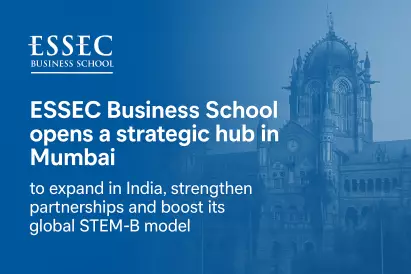Eduniversal Best Masters Ranking in Singapore
Master's degrees in Singapore in 2025 are crucial for upskilling professionals and aligning education with the country's innovation-driven economy. This article explores labour market trends, emerging academic programs, delivery models, and key challenges and opportunities in postgraduate education. The insights serve students, educators, and employers navigating Singapore's evolving higher education landscape.
Discover in detail the Master in Singapore
Current Landscape of Education and
Summary: Master’s degrees in Singapore in 2025 play a strategic role in bridging higher education with workforce demands, especially amid technological disruption and global economic shifts. This article covers major trends, labour market dynamics, evolving programs, delivery formats, challenges, and key future opportunities in master’s education across Singapore.
Current Landscape of Education and Employment in Singapore
As of 2025, Singapore’s labour market presents a dual reality: a relatively high unemployment rate of 2.0% and a concurrent shortage of specialized talent.
With the nation’s digital transformation agenda accelerating, industries increasingly seek graduates skilled in areas such as artificial intelligence, cybersecurity, and data analytics.
This discrepancy positions master’s programs in Singapore as essential tools for individuals aiming to remain competitive in the workforce.
These programs are becoming integral to national strategies that foster a future-ready workforce and support life-long learning initiatives.
Fields like cybersecurity and data protection now feature prominently in educational policy and employer hiring priorities.
Shifting Trends in Master’s Program Disciplines
Growing demand for professionals equipped to handle data, sustainability, and innovation has influenced the orientation of several master’s fields.
Courses related to digital business, sustainability, financial engineering, and data analytics are fast becoming staples in the academic catalog of Singaporean institutions.
This evolution reflects the balance institutions must strike between academic depth and industry responsiveness.
Programs in green finance and supply chain innovation reinforce Singapore’s global reputation in finance, logistics, and sustainability sectors.
Universities are incorporating global trends to prepare graduates for both local and international career trajectories.
Flexible and Interdisciplinary Program Models
Flexibility is now foundational in Singapore’s master’s offerings. From part-time degrees to stackable credentials, learners can now pursue education while working. Programs often merge tech and business—for instance, blending AI tools with management principles—preparing students for blended roles in dynamic sectors.
This flexibility aligns with emerging interests in fields like innovation and project management, which demand versatile skills across domains.
Extended completion timelines and hybrid modules empower mid-career professionals seeking career shifts or advancement while managing personal commitments.
Impact of Digital Transformation and Online Education
Government and private investments in EdTech exceeding USD 300 million have enabled significant expansion of digital learning modes. Institutions now offer hybrid or fully online master’s programs, ensuring accessibility both for local and foreign students—including professionals working abroad.
This digitization trend mirrors majors like information systems management, which increasingly utilize virtual labs, simulations, and real-time collaboration features.
This transformation enhances international reach and diversifies classroom perspectives.
Singapore’s Appeal as an International Education Hub
Singapore’s master’s programs maintain strong global recognition, attracting students across Asia, Europe, and beyond.
Their integration of global case studies and international faculty ensures that graduates are equipped to navigate diverse professional environments.
Programs bridge Western methodologies with Asian business practices—a unique positioning that bolsters student mobility and employer demand.
Cross-cultural programs in areas such as international management stand out in this context, fostering multicultural insights and global employability. Simultaneously, international collaborations have paved the way for dual-degree programs and virtual exchanges.
Challenges in Singapore’s Master’s Education Sector
Despite this growth, challenges persist. Affordability is a top issue, especially for working professionals balancing tuition with personal and family responsibilities. Industry expectations also shift rapidly, and institutions must continuously align curricula with the technology and business landscapes.
Balancing quality and scale becomes more complex as hybrid and online programs proliferate. This necessitates more robust accreditation frameworks and partnerships with employers to ensure ongoing relevance.
Degrees in business intelligence and strategic management must consistently evolve with real-world applications to retain credibility.
Emerging Opportunities in Singapore’s Graduate Education
Institutions that embrace pedagogical innovation—such as project-based assessments and real-world case collaborations—are redefining the educational experience.
With government support via initiatives like SkillsFuture, and increasing collaboration between universities and industries, the foundation is set for programs that mirror workplace dynamics.
Emerging sectors including sustainable development, digital marketing, and creative industries also open avenues for thematic and targeted master's programs. Singapore is poised to lead in aligning education with global economic shifts, driven by both policy and entrepreneurial ecosystems.
Discover Eduniversal Best Masters Ranking in Singapore by specialization
Latest news
ESSEC Business School opens a strategic hub in Mumbai to expand in India, strengthen partnerships and boost its global STEM-B model.
SKEMA Business School has opened a new campus in Dubai’s DIFC, one of the Middle East’s top financial hubs. Located near global firms like HSBC and Rothschild, the campus strengthens SKEMA’s international footprint and corporate ties.
Nova SBE partners with Deloitte to launch a five-year scholarship for its Master’s in Finance. The initiative strengthens the Portuguese business school’s position among Europe’s top finance programs and reinforces corporate-backed talent development.



